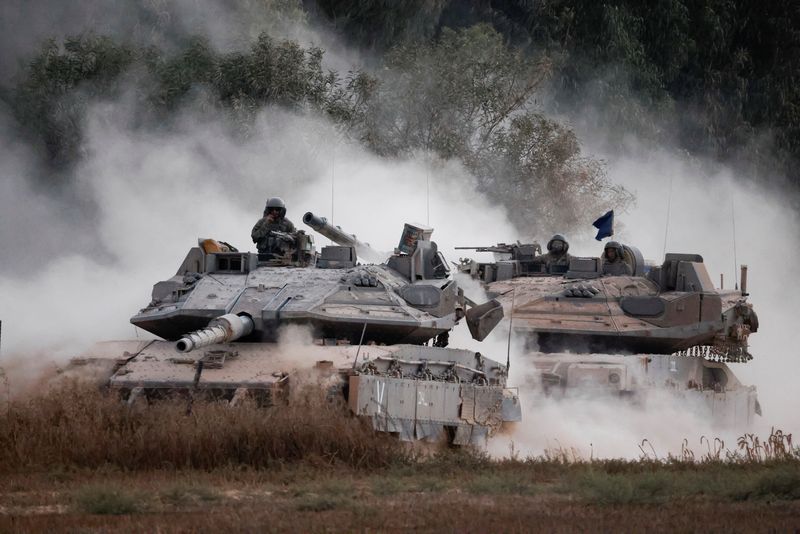Authors: Samia Nakhoul, Muhammad Al Gebaly and Nidal al-Mughrabi
DUBAI/CAIRO (Reuters) – Hamas has accepted a U.S. offer to start working on the release of Israeli hostages 16 days after the signing of the first phase of a deal aimed at ending the war in Gaza, a senior Hamas source told Reuters on Saturday. (including soldiers and men) to negotiate.
The radical Islamist group dropped its demand that Israel first commit to a permanent ceasefire before signing a deal and will allow talks to proceed in the first six-week phase, the source told Reuters, asking not to be identified because the talks are private. to achieve this goal.
A Palestinian official close to the internationally mediated peace effort said that if Israel accepted the proposal, a framework agreement could be reached and would end the nine-month war between Israel and Hamas in the Gaza Strip.
A source on the Israeli negotiating team, speaking on condition of anonymity, said on Friday that there was now a real chance of reaching a deal. This is in stark contrast to the past nine months of the Gaza war, when Israel said the conditions proposed by Hamas were unacceptable.
A spokesman for Israeli Prime Minister Benjamin Netanyahu did not immediately respond to a request for comment on Saturday, the Jewish Sabbath. On Friday, his office said negotiations would continue next week, stressing that differences between the two sides remained.
Health officials in Gaza say the conflict has claimed the lives of more than 38,000 Palestinians since Hamas launched an attack on the southern Israeli city on Oct. 7, killing 1,200 people and taking about 250 hostages, according to official Israeli data.
Hamas sources said the new proposal would ensure mediators guarantee a temporary ceasefire, aid and the withdrawal of Israeli troops as long as indirect talks continue to implement the second phase of the agreement.
Efforts to secure a ceasefire and the release of hostages in Gaza have intensified in the past few days amid aggressive shuttle diplomacy between Washington, Israel and Qatar, which is leading mediation efforts in Doha, home of the exiled Hamas leader.
A regional source said the U.S. government was working to reach a deal before the November presidential election.
Netanyahu said on Friday that the head of Israel’s Mossad intelligence agency had returned from preliminary meetings with mediators in Qatar and that talks would continue next week.
battle rage
Meanwhile, Israeli forces have stepped up military strikes against the enclave, which health officials in the region said have killed at least 29 Palestinians and injured 100 others in the past 24 hours.
Five local journalists were among those killed in multiple airstrikes, bringing the number of journalists killed since Oct. 7 to 158, according to the media office of the Hamas-led Gaza government.
Israeli forces carried out an airstrike on Rafah near the Egyptian border on Saturday, killing four Palestinian police officers and wounding eight others, health officials said.
A statement from the Hamas-controlled interior ministry said the four included Fares Abdel-Al, the head of the police force in the western community of Tel Sultan Rafah.
The Israeli military said its troops continued “Operation Intelligence Base” in Rafah, destroying some underground buildings, seizing weapons and equipment and killing several Palestinian gunmen.
Israel says its operation in Rafah is aimed at eliminating the last remaining armed forces of Hamas.
Medical officials said an Israeli airstrike on a house in the central Nuserat refugee camp, one of the enclave’s eight historic camps, killed 10 Palestinians.

The Israeli military said it neutralized a Hamas rocket cell operating in a designated humanitarian area. It said the precision strikes were carried out after measures were taken to ensure civilians were not harmed. Hamas denies Israeli accusations that it uses civilian property for military purposes.
Armed factions of Hamas and Islamic Jihad said the militants used anti-tank rockets and mortars to attack Israeli forces in several areas of the enclave.
(Reporting and writing by Samia Nakhoul, Muhammad Al Gebaly and Nidal al-Mughrabi; Additional reporting by Maayan Lubell and Emily Rose. Editing by Raju Gopalakrishnan, William Mallard and Toby Chopra)

